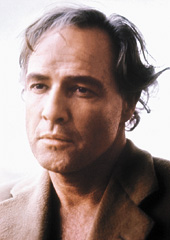 |
| Rebel: Marlon Brando in Last Tango in Paris |
Los Angeles, July 2 (Reuters): Marlon Brando, the reclusive Oscar-winning actor who was one of the most influential stage and screen performers of his generation, has died at age 80, associates said today.
The cause of death was not immediately known. Media reports citing friends and Brando’s lawyer said he died at a Los Angeles hospital yesterday.
With his broken nose and rebellious nature, Brando established a more naturalistic style of acting and defined American macho for a generation with classic performances in A Streetcar Named Desire (1951), The Wild One (1953) and On the Waterfront (1954). Francis Ford Coppola, who directed Brando in Apocalypse Now, said: “Marlon would hate the idea of people chiming in to give their comments about his death. All I’ll say is that it makes me sad he’s gone.”
To many, Brando remained the motorcycle-riding rebel he played in The Wild One. Asked what he was rebelling against, Brando replied, “Whaddya got?”
Brando won an Academy Award for On the Waterfront and another for his brooding, at times mumbling, portrayal of the patriarch of a Mafia family in The Godfather (1972).
But Brando also railed against Hollywood and chafed at the pomp of stardom throughout a stormy career. In 1973, he refused to accept his second Oscar to protest the treatment of American Indians and later professed not to know what had happened to the award.
 |
In more recent years, Brando’s brilliance as an actor was overshadowed by his eccentric reclusiveness, the turmoil in his family life and financial disputes. Christian Brando, his son by his first wife, Welsh actor Anna Kashfi, was sentenced to 10 years in prison for the 1990 murder of his half-sister Cheyenne’s boyfriend. Cheyenne later committed suicide, in 1995, at the age of 25.
Brando, who was paid a then-staggering $14 million for his walk-on performance in 1978’s Superman, remained enmeshed in legal disputes over money up until his final weeks. He poured millions into Tetiaroa, a South Seas atoll he bought in 1966 and where he spent much of the 1980s living out a fascination with Tahiti rekindled while shooting Mutiny on the Bounty.
He said he only made movies for the money. “Acting is an empty and useless profession,” he said.
Brando was born on April 3, 1924, in Omaha, Nebraska, the son of a calcium carbonate salesman and an actor who coached a local drama group. He was sent to a Minnesota military academy but was soon expelled.
He headed to New York, where he took up drama, studying with famed teacher Stella Adler and the Actors’ Studio. “Marlon never really had to learn how to act. He knew,” Adler once said. “Right from the start he was a universal actor. Nothing human was foreign to him.”
In 1947, playwright Tennessee Williams approved selecting Brando to play the brutish Stanley Kowalski in the stage production of A Streetcar Named Desire. Brando resisted Hollywood until 1950, but then turned in memorable performances in Elia Kazan’s 1951 film version of Streetcar and Viva Zapata! (1952), the story of a Mexican peasant revolutionary.
In On the Waterfront, Brando played a one-time boxer who turns against his friends and brother in a corrupt union.
In one of the most famous scenes in cinema, Brando tells his brother, played by Rod Steiger, “Oh, Charlie, oh, Charlie ... you don’t understand. I could have had class. I could have been a contender. I could have been somebody, instead of a bum — which is what I am.”










